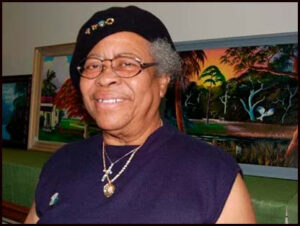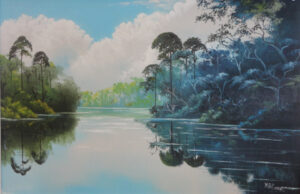Mary Ann Carroll was honored at an event in Sarasota.
By Ramon Lopez
Original Air Date: Mar. 29, 2024
Host: The Florida Highwaymen were – well – not just men. Ramon Lopez puts the spotlight on the sole woman member of this group of painters.
Ramon Lopez: This past week, as part of Women’s History Month, Sarasota art lovers had the opportunity to learn more about The Highwaymen.
They were a group of 26 African-American artists who painted landscapes throughout the Sunshine State starting in the 1950s. Mary Ann Carroll was the only woman among the group. Their artwork freed them from menial jobs, including picking oranges. Most, including Carroll, were from the Fort Pierce area.

Mary Ann Carroll
The self-taught artisans sold their artwork on Florida highways and back roads from the trunks of their cars and door-to-door. This, because they were barred from art galleries in the Jim Crow segregated South.
Dirt poor, they painted on discarded wallboard and used tossed crown molding for picture frames, to create a body of art that captured the state’s natural beauty — backwoods scenes, palm-lined beaches and majestic rivers. Their paintings are now sought after by collectors.
Mary Ann Carroll, who passed away in December 2019 at age 79, was the so-called First Lady of the Highwaymen. She was inducted into the Florida Artists Hall of Fame in 2004. In 2011, she was honored at the White House by then-First Lady Michelle Obama.
A child of sharecroppers, and a single parent with seven children to feed, Carroll painted to make ends meet, starting in high school. And she braved the back roads of the segregated South to sell her art.
A 2010 documentary on Carroll let us hear, in her own words, her life story.
 Mary Ann Carroll: All my life, as a little girl, I could draw most things I could see, and I was very creative as a kid. I felt bad I could sit down and start looking at a piece of artwork — mine, whose ever — and drift off into it and forget about how you were to see. When I picked something like this, my mind is free free. Of all the female artists and the Highwaymen, I really got joy out of painting and being around the guys.
Mary Ann Carroll: All my life, as a little girl, I could draw most things I could see, and I was very creative as a kid. I felt bad I could sit down and start looking at a piece of artwork — mine, whose ever — and drift off into it and forget about how you were to see. When I picked something like this, my mind is free free. Of all the female artists and the Highwaymen, I really got joy out of painting and being around the guys.
RL: She never feared driving about to sell her paintings.
MAC: It never gave me a problem, because I was putting makeup on a tomboy, and I could fist fight, I could wrestle, and you had to be a good man to throw me, and if he didn’t measure out, I’d flip him. And so therefore I was never afraid. So this gave me some courage. It was a lot of bad times, sad times, poverty stricken times. But that is something that you learned to live around without getting caught up in it. Life is just what you make it. It can be beautiful. And it can be entangling? I believe that my responsibility made me a better woman. But I could have gotten to the point in life and said ‘It can’t be done’, but I just found that it can be done, and it was done.
RL: One of Carroll’s daughters, Dr. Renee Mills, an educator, drove to Sarasota from Sanford to lecture on the legacy of her mother. Dr. Mills has self-published a book entitled Queen of the Road. Mary Ann Carroll, The Sole Woman of the Highwaymen Artists.
Dr. Mills is on a mission.
Renee Mills: My goal in life is to continue spreading the word of my mom, her legacy, and to make sure that that part of Florida history doesn’t go away. And more importantly, that it is passed on for generations and generations to come.
RL: Dr. Mills said Mary Ann Carroll was both an artist and a deeply religious woman who feared nothing, including death.
RM: And then, when she wasn’t selling to those in the church, she had no fear of dying. So as in her saying since I can remember: ‘Give me my roses while I live. Don’t come crying when my body is in a funeral home. Tell me you love me while I live.’ I just never saw her leaving ever. Ever.
RL: We’ll give Mary Ann Carroll the final word.
MAC: … I’ve always been determined to stand up …. And I don’t have any regret. But I know it wasn’t easy, and no, it wasn’t easy, but it made it easy. I’ve never felt like a job was too hard for me to try. There I was, digging ditches. So nothing was too difficult. It was a challenge, you know, and I’ve always felt like I can win. And I did.
RL: This is Ramon Lopez for WSLR News.
WSLR News aims to keep the local community informed with our 1/2 hour local news show, quarterly newspaper and social media feeds. The local news broadcast airs on Wednesdays and Fridays at 6pm.